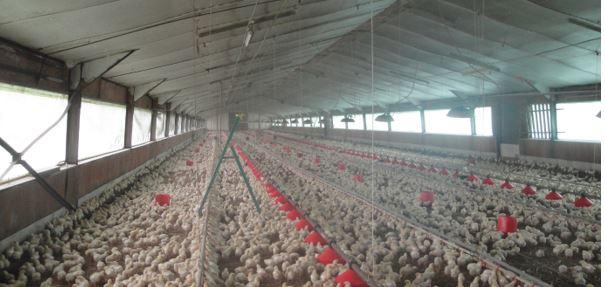- Home
- Worldwide
- CIRAD worldwide
- Projects
- BIOFLUARN Project
Prevention and rapid control of emerging infectious diseases in livestock - BIOFLUARN

Broiler chicken farm in France © Claire Hautefeuille, CIRAD
Issues
The prevention and rapid control of emerging infectious diseases in livestock have become a global necessity over the last decade, in particular because of the emergence and spread of high-risk pandemic viruses such as influenza viruses (H5Nx, H1N1) and COVID-19. Livestock plays a major role in some outbreaks and in the amplification of influenza viruses with zoonotic potential. Indeed, the major influenza pandemics of the 20th century all originated in animal influenza viruses. Humans can be infected by these zoonotic viruses, such as avian and swine influenza viruses.
These influenza viruses are also devastating for pig and poultry production. To illustrate this, the epizootics of highly pathogenic avian influenza H5 in 2021-2022 and 2022-2023 resulted in the culling and loss of almost 100 million domestic birds in Europe and of tens of thousands of wild birds. Swine influenza viruses are present in the global pork industry and are neglected in some geographical areas.
Vaccination is one of the tools used to control the circulation of avian and swine influenza viruses. It is essential to be able to provide vaccine solutions that are effective, safe, rapid and affordable for these two species and for the whole world, addressing the requirements of new health strategies, including emergency vaccination measures. These solutions should help to reduce the impact, or even to control the transmission of influenza in livestock, but also to limit the risks of transmission to humans, including pandemic risks.
Description
The main activities proposed in this project are the following:
1. The collection of data from field activities and surveillance networks leading to the genetic and antigenic characterisation of avian influenza viruses H5, H7 and H9 and swine influenza viruses H1 and H3 throughout the world;
2. The creation of a bioinformatics platform at Ceva (Angers site) for the development of vaccines against avian and swine influenza viruses;
3. The development of Ceva candidate vaccines (platform of self-replicating RNA vaccines);
4. The development of diagnostic and epidemiological tools: i) to monitor the effectiveness of vaccines in the field, ii) to optimise vaccination strategies at the national level for poultry and pork production networks, and iii) to model national and international propagation in order to anticipate local vaccination requirements.
CIRAD is mainly involved in activities 1 and 4, providing support for the collection and analysis of monitoring data and developing an epidemiological model of viral transmission to test different vaccination strategies according to the structure of the livestock production network and the epidemic context. A thesis on the evaluation of swine influenza vaccination strategies will be conducted in the framework of this project, as well as several Masters 2 internships.
The BioFluARN project is based on a long-standing collaboration between Ceva Santé Animale and CIRAD. Ceva and CIRAD have been working together since 2013 on the evaluation of vaccination strategies in the context of the fight against avian influenza in several countries (see EVACS project).
Expected results
This project will support the rapid and effective development of vaccines against avian and swine influenza viruses. It will include evaluations of the effectiveness of these vaccines, the development and validation of a diagnostic tool to monitor vaccination in the field, and modelling of immunity in vaccinated populations.























